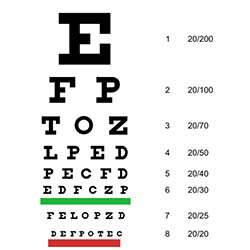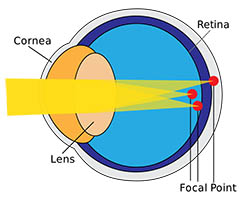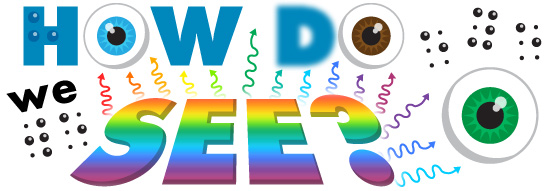Do You Need Glasses?
You squint your eyes, lean forward a bit, and close one eye. You open that eye, close the other, squint again, and pull your head back. No matter what you seem to do, the sign still looks blurry. Did someone make a blurry sign? Or might you need glasses? Lots of people have problems with vision that can be corrected with glasses or contact lenses. To get these, you should visit the eye doctor.

There are two types of vision experts that you can see to have your eyes checked. An optometrist has special training to examine eyes and can give prescriptions for glasses and contact lenses. An ophthalmologist is a doctor who, in addition to checking your eyes and giving prescriptions for glasses and contact lenses, can also perform surgeries to fix eyes that have been injured.
Some people go to an eye doctor each year to check that their eyes are healthy. During an exam, the eye doctor will usually ask a patient if they have any trouble seeing things up close, far away, and when it is dark. The doctor might also take a picture of the inside of a patient’s eye by having them look into some fancy binoculars. This picture is called a retinal scan and lets the eye doctor see the retina and check that the blood vessels and tissue look healthy. During the next part of the exam the patient will be asked to look at an eye chart and to cover one of their eyes to see how well they can read the letters with the uncovered eye. How does this let them know that the patient needs glasses?
Near Sightedness

A person who has good vision when viewing something up close, but blurry vision when viewing something far away, is probably near sighted. What does “Near Sighted” actually mean? Near sightedness, or “Myopia,” is a condition that occurs when the eye has a long shape or the cornea is too curved.
This causes light to enter the eye and create an image in front of the retina. To treat this problem, the eye doctor will need to prescribe glasses that will refocus the light onto the retina and not in front of it.
Far Sightedness
A person who can clearly see objects that are far away, but cannot read print on a page that is close to their eyes, is likely far sighted. Far sightedness, or “Hyperopia,” is a condition that occurs when the eye is short or the cornea curves too little. The image that is projected into the eye would be in focus behind the retina. In order to see in focus, the eye doctor will need to prescribe glasses that refocus the light onto the retina and not behind it.
Astigmatism

Occasionally there can be something wrong with the lenses in the eye. If the lenses are not smooth or extra thick or thin in some areas, this will change the way that the image is projected into the eye. This is called astigmatism.
If the image does not lay flat on the retina then the final picture that the brain sees will be blurry in spots. Special lenses can be designed so that light coming into the eye will focus correctly on the retina.
Additional images via Wikimedia Commons.
Read more about: How Do We See?
Bibliographic details:
- Article: Do You Need Glasses?
- Author(s): Dr. Biology
- Publisher: Arizona State University School of Life Sciences Ask A Biologist
- Site name: ASU - Ask A Biologist
- Date published: 1 Jul, 2015
- Date accessed:
- Link: https://askabiologist.asu.edu/do-you-need-glasses
APA Style
Dr. Biology. (Wed, 07/01/2015 - 12:24). Do You Need Glasses?. ASU - Ask A Biologist. Retrieved from https://askabiologist.asu.edu/do-you-need-glasses
Chicago Manual of Style
Dr. Biology. "Do You Need Glasses?". ASU - Ask A Biologist. 01 Jul 2015. https://askabiologist.asu.edu/do-you-need-glasses
MLA 2017 Style
Dr. Biology. "Do You Need Glasses?". ASU - Ask A Biologist. 01 Jul 2015. ASU - Ask A Biologist, Web. https://askabiologist.asu.edu/do-you-need-glasses

If this picture looks blurry, don't worry, it's not your eyes. Eyes can produce blurred images, but so can telescopes and cameras. This picture of a spiral galaxy from the Hubble telescope showed a mirror needed to be repaired.
Be Part of
Ask A Biologist
By volunteering, or simply sending us feedback on the site. Scientists, teachers, writers, illustrators, and translators are all important to the program. If you are interested in helping with the website we have a Volunteers page to get the process started.

